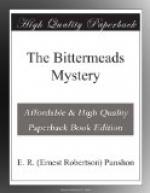“What a wonderful place!” Ella sighed wistfully. Yet she could not enjoy the spectacle of all these treasures as she would have done at another time, for she was always watching Allen, who hung about a good deal, and seemed to look more at the locks of the cases that held some of the more valuable of the objects shown than at the things themselves, and generally spent fully half the time in each room at the window, admiring, the view, he said; but for quite another reason, Ella suspected.
“I shall speak when I get back,” she said to herself, pale and resolute. “I don’t care what happens; I don’t care if I have to tell mother—perhaps she knows already. Anyhow, I shall speak.”
Having come to this determination, she grew cheerful and more interested apparently in what they were seeing, as well as less watchful of her companion. When, presently, they left the house to go into the gardens, it happened that they noticed an old gentleman walking at a little distance behind a gate marked “Private,” and leaning on the arm of a tall, thin, clean-shaven man of middle-age.
“Lord Chobham, the old gentleman,” whispered a tourist, who was standing near. “I saw him once in the House of Lords. That’s his secretary with him, Mr. Dunsmore, one of the family; he manages everything now the old gentleman is getting so feeble.”
Ella walked on frowning and a little worried, for she thought she had seen the secretary before and yet could not remember where. Soon she noticed Dunn, who had apparently been obeying Deede Dawson’s orders to look round outside and get to know the lie of the land.
He seemed at present to be a good deal interested in Lord Chobham and his companion, for he went and leaned on the gate and stared at them so rudely that one or two of the other tourists noticed it and frowned at him. But he took no notice, and presently, as if not seeing that the gate was marked “Private,” he pushed it open and walked through.
Noticing the impertinent intrusion almost at once, Mr. Dunsmore turned round and called “This is private.”
Dunn did not seem to hear, and Mr. Dunsmore walked across to him with a very impatient air, while the little group of tourists watched, with much interest and indignation and a very comforting sense of superiority.
“He ought to be sent right out of the grounds,” they told each other. “That’s the sort of rude behaviour other people have to suffer for.”
“Now, my man,” said Mr. Dunsmore sharply, “this is private, you’ve no business here.”
“Sorry, sir; beg pardon, I’m sure,” said Dunn, touching his hat, and as he did so he said in a sharp, penetrating whisper: “Look out— trouble’s brewing—don’t know what, but look out, all the time.”
He had spoken so quickly and quietly, in the very act of turning away, that none of the onlookers could have told that a word had passed, but for the very violent start that Walter Dunsmore made and his quick movement forward as if to follow the other. Immediately Dunn turned back towards him with a swift warning gesture of his hand.




